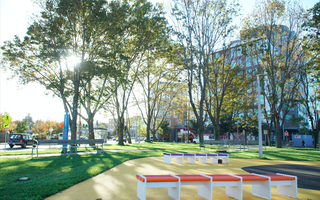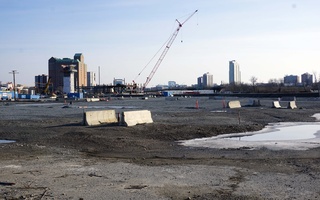{shortcode-e1865516140927091020bb563de84d754c1d2668}
Harvard officially filed a master plan for a segment of its Allston properties with Boston’s urban planning agency in early December—but the document will likely remain under review for weeks to come.
In January, the Boston Planning and Development Agency—the city’s planning body—extended the public comment period for the plan, ensuring Harvard must continue to gather feedback from local residents until early February. And, in response to a request from an advisory group of Allstonians helping oversee the University’s plans for the area, Harvard will hold extra meetings with area residents to discuss the filings, according to University spokesperson Kevin Casey.
The group of Allston residents—known as the Impact Advisory Group—is responsible for identifying possible social and environmental impact Harvard’s projects may have on the area, as well as determining steps to mitigate those effects. Based on the recommendations of this group, the city’s planning agency may ask Harvard to modify its plans.
“Harvard is pleased that the Boston Planning and Development Agency has extended the comment period until early next month, giving IAG and community members more time to review and respond to the plan, and for Harvard to answer any questions the members may have,” Casey wrote in an emailed statement.
The University filed the proposals with the agency on Dec. 7, specifically for a 14-acre portion of its Allston holdings known as the “Enterprise Research Campus,” a planned 36-acre center for entrepreneurship. According to the filings, the 14-acre segment will include 400,000 square feet of offices and labs, 250,000 square feet of hotel and conference center space, 250,000 square feet of residential space, nearly 900 parking spaces, and around 600 new bicycle parking spaces.
Harvard first proposed developing the enterprise research campus in 2011, when the Harvard Allston Work Team recommended the idea. In 2016, the University hired real estate agent Steven D. Fessler to serve as “head of enterprise real estate” and to guide construction of the area.
University officials presented specific plans for the 14-acre segment of the campus to Allston residents at a meeting in Nov. 2017. At the time, the University also described plans to construct two new roadways, Cattle Drive and East Drive, as well as various measures intended to better combat potential effects of climate change going forward.
At an Allston Impact Advisory Group meeting last week, Allston residents raised a variety of concerns about transportation, bike paths, housing, height of buildings, and green spaces. The University will likely discuss these and other issues at future Impact Advisory Group meetings.
After the review process ends, Harvard must find a development partner and write a building proposal. Following these steps, Harvard must submit an Article 80 filing to request approval for a Planned Development Area Development Plan, a more specific plan which will cover the zoning for this project.
If Boston’s planning agency approves the plan under Article 80, the body would then hold a public hearing before the decision to consider public comments.—Staff writer Truelian Lee can be reached at truelian.lee@thecrimson.com
—Staff writer Jacqueline P. Patel can be reached at jacqueline.patel@thecrimson.com
Read more in News
For Likely Candidates, Harvard’s Top Job Would Bring Pay RaiseRecommended Articles
-
Harvard Hires Real Estate Veteran to Develop Allston 'Enterprise' CampusHarvard’s loosely defined “Enterprise Research Campus,” a planned 36-acre center for entrepreneurship in Allston, now has someone to guide its construction.
-
 Amid Resident Concerns, Harvard Pushes New Development in Allston
Amid Resident Concerns, Harvard Pushes New Development in Allston -
 Allstonians Worry Harvard’s Plans Privilege Vehicle Transit
Allstonians Worry Harvard’s Plans Privilege Vehicle Transit -
 Allstonians Brainstorm Solutions to Traffic Congestion
Allstonians Brainstorm Solutions to Traffic Congestion -
 BPDA Approves Harvard's Initial Plans for ‘Enterprise’ Campus
BPDA Approves Harvard's Initial Plans for ‘Enterprise’ Campus













